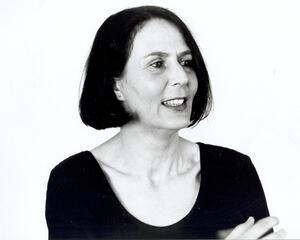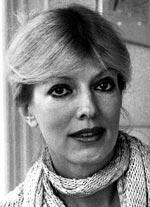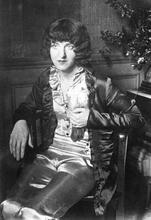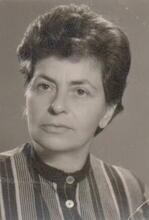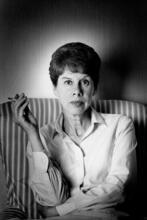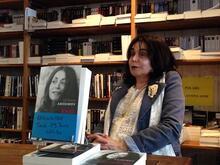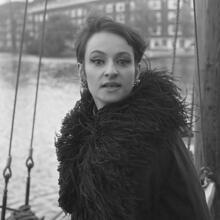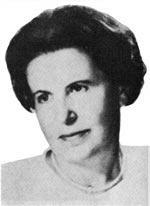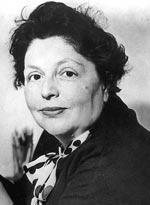Carl Friedman
Dutch writer Carl Friedman was the author of several international bestsellers about the Holocaust and second-generation trauma. Friedman’s father, Egbert, had been in the resistance during World War II; interned by the Nazis in concentration camps, he survived the Death Marches. Egbert’s traumas shaped Friedman’s youth and became the main theme of her literary work. Her debut novel, Tralievader (1991), tells the story of a father’s camp history and its impact on his family; Twee koffers vol (1993) explores the long-suppressed Holocaust-induced traumas of the protagonist’s parents. Based on her writings, it was broadly assumed that Friedman was Jewish, until it was revealed in 2005 that her parents were Catholic. The ensuing controversy marred her literary career. Several sources now describe Friedman as someone who self-identified as Jewish.
A little girl pays a visit to the zoo. As soon as she approaches a caged wolf, she starts weeping bitterly. The eyes of the wolf remind her of those of her father, who had been imprisoned in a Nazi concentration camp during World War II. Looking at the wolf behind the bars the little girl sobs: “He has camp.” This remarkable passage occurs in Dutch author Carl Friedman’s debut work, Tralievader (later published in English as Nightfather). When Friedman passed away in 2020, she was remembered not only for her popular books, but also for the controversy about her non-Jewish background.
Early Life and Career
Friedman was born Carolina Klop in the city of Eindhoven in the south of the Netherlands on April 29, 1952, into a Catholic family. She had two older brothers. Her father, Egbert Klop, had been in the Dutch resistance during World War II. After being arrested by the Nazis, he was interned in concentration camps, first in Vught and then in Sachsenhausen, and survived the Death Marches after the camps’s evacuation in 1945. After the war, Egbert was awarded the Military William Order, the Netherland’s highest honor for bravery. His traumas shaped Friedman’s youth and became the main theme of her literary work.
After attending high school, Friedman trained in Antwerp to become an interpreter-translator. Later she moved to Breda, a city close to Eindhoven, where she worked as a member of the editorial staff of the newspaper De Stem (The Voice). After a brief marriage to David Friedman, who was Jewish, she moved to Amsterdam with her son Aron, who was born in 1979.
Literary Career
Friedman kept her ex-husband’s name, and in 1991 she published Tralievader, under the name of Carl Friedman. Tralievader tells the story of the camp history of a Jewish father, Jochel, and its impact on his family, told from the perspective of his young daughter. The book challenges the idea that Holocaust survivors are unable to talk about their trauma: all Jochel ever does is talk about it. Seemingly random situations in his postwar life prompt him to share with his wife and children, in great detail, what he went through in the camps. As a result, his children struggle to distinguish their father’s stories from their own world. “I’ve had camp,” Jochel tells his children, describing not so much a place but a condition; in the imagination of his small daughter, this condition might be shared by a wolf, behind bars in the zoo.
Tralievader was translated into several languages, including German, English, Hebrew, and Italian. In 1995 it was made into a movie, Nightfather, by the Dutch-Israeli director Danniel Danniel. By then Friedman had published Twee koffers vol (literally “two full suitcases,” but often translated as “The Shovel and the Loom,”), which came out in 1993 and was translated into German, French, and Russian. In this novel, set in Antwerp in the 1970s, twenty-year-old Chaya has renounced God and tries to find consolation for her existential doubts by studying philosophy. Looking for extra earnings, she starts working as a baby-sitter for an Orthodox Jewish family. A special relationship develops between Chaya and the toddler Simcha. Her employer reminds Chaya of her own Jewish background, and especially of the long-suppressed Holocaust-induced traumas of her parents. In 1998 the English-language film based on Twee koffers vol, translated as Left Luggage and directed by Jeroen Krabbé, appeared. Like the book, it was a success both in the Netherlands and abroad. Left Luggage won several prizes, including the Blue Angel Award for Best European Film at the 1998 Berlin International Film Festival.
In 1996 De grauwe minnaar (The Gray Lover) appeared, a collection of three long stories. It was translated into German, English, and Italian and was nominated for the Aristeion Prize, an annual prize for significant contributions to European literature. Friedman started writing columns for the newspaper Trouw and, beginning in 2002, for the magazine Vrij Nederland. She often wrote about discrimination, and about antisemitism in particuar. Collections of her columns were published in 2001 under the title Dostojevski’s paraplu (Dostojevki’s Umbrella) and in 2004 under the title Wie heeft de meeste joden (Who has most Jews). In 2003, Tilburg University awarded Friedman the E. du Perron literary prize for her entire oeuvre. That same year, one of her stories was included in the collection Nothing Makes You Free: Writings by Descendants of Jewish Holocaust Survivors.
Controversy
With her focus on Holocaust victims and second-generation traumas, it had been broadly assumed, both in Netherlands and abroad, that Carl Friedman had a Jewish background, although she never explicitly claimed Jewish ancestry. In 2005 her birth name was revealed, along with her parents’ Catholic identity. At the time, several Dutch-Jewish writers considered it a disgrace that Friedman had never admitted that she did not have a Jewish background. Many assumed that she had lied about her father’s camp experiences, but her publisher, Van Oorschot, as well as family members corrected this assumption, underlining that Tralievader was indeed, to a large extent, autobiographical.
Friedman herself did not respond to the accusations. Several sources now describe her as someone who self-identified as Jewish. In 2006, her son Aron stated that his mother had suffered a great deal from the fact that both her person and her work had been dragged through the mud, and that she was working on a new book. This work was never published; apart from an anthology of Russian stories and a limited edition collection of poems, Friedman never published again after the controversy.
Friedman passed away in Amsterdam on March 27, 2020, at the age of 67. Her books are still widely read both in the Netherlands and abroad.
SELECTED WORKS BY CARL FRIEDMAN
Gedichten. Haarlem: De Korenmaat, 2020.
Bijt me toch, bijt me! De mooiste dierenverhalen uit de Russische bibliotheek. Chosen and introduced by Carl Friedman. Amsterdam: Van Oorschot, 2013.
Wie heeft de meeste joden. Amsterdam: Van Oorschot, 2004.
Buket, Melvin Jules, ed. Nothing Makes You Free: Writings by Descendants of Jewish Holocaust Survivors. W.W. Norton Company, 2003.
Dostojevski’s paraplu. Amsterdam: Van Oorschot, 2001.
De grauwe minnaar. Amsterdam: Van Oorschot, 1996. Translated as The Gray Lover: Three Stories. New York: Persea Books, 1998.
Twee koffers vol. Amsterdam: Van Oorschot, 1993. Translated as The Shovel and the Loom. New York: Persea Books, 1996.
Tralievader. Amsterdam: Van Oorschot, 1991. Translated as Nightfather. New York: Persea Books, 1994.
Peters, Arjan. “Carl Friedman was een sobere schrijver over de verwerking van de oorlog (1952-2020).” Volkskrant, March 30 , 2020. https://www.volkskrant.nl/cultuur-media/carl-friedman-was-een-sobere-sc…
Rijken, Kemal. “Overleden schrijfster Carl Friedman (67) kwam in opspraak over haar vermeende Joods zijn.” Jonet, March 31, 2020. https://jonet.nl/overleden-carl-friedman-67-kwam-in-opspraak-over-haar-…

